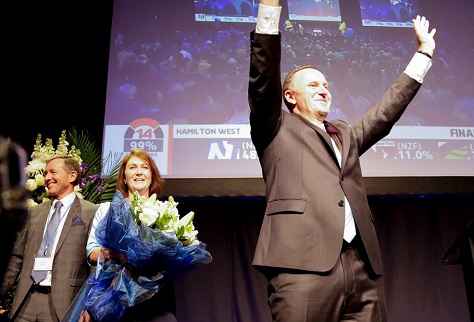New Zealand’s voters didn’t have a chance to vote on a new flag during Saturday’s general elections, but they emphatically delivered prime minister John Key a third term in government.![]()
Key (pictured above) led the center-right National Party to a majority government, winning 61 seats in the country’s unicameral, 121-member House of Representatives, the first such majority government since 1993, when the country still used a first-past-the-post voting system. New Zealand today uses instead a mixed-member proportional representation system.
 Though the campaign featured more political scandal and innuendo about surveillance than policy discussion, Key has in two terms amassed a considerably solid record. In his first term, he helped to steady New Zealand’s economy in the depths of the global financial crisis, and he’s maintained generally solid GDP growth — around 2.5% in 2013 — in the face of a Chinese economic slowdown.
Though the campaign featured more political scandal and innuendo about surveillance than policy discussion, Key has in two terms amassed a considerably solid record. In his first term, he helped to steady New Zealand’s economy in the depths of the global financial crisis, and he’s maintained generally solid GDP growth — around 2.5% in 2013 — in the face of a Chinese economic slowdown.
In that time, Key raised the goods and sales tax from 12.5% to 15%, but he also lowered personal income tax rates and increased the minimum wage from NZ$ 12 to NZ$ 14.25. In his second term, Key initiated a program of privatization of several government interests by reducing public ownership in several companies, including Air New Zealand and several energy enterprises. Key also managed the reconstruction efforts of Christchurch, New Zealand’s second-most populous city, which was severely damaged by a 2011 earthquake.
He has also been keen on developing stronger ties with the United States as a champion of the Trans-Pacific Partnership trade pact and of the 2010 Wellington Declaration, which ushered in greater cooperation between the United States and New Zealand.
Since Key defeated former prime minister Helen Clark in 2008, the center-left Labour Party has gone through three leaders — Phil Goff, David Shearer and David Cunliffe, who won a leadership contest last September. Cunliffe, a former health and communications minister, defeated the more progressive, openly gay favorite of the Labour caucus, Grant Robertson. Having led the Labour Party to a loss of two seats in the House of Representatives and a 2.79% drop in support in the weekend’s election, its 24.69% support marks the party’s worst performance since the 1920s, Labour might jettison Cunliffe in favor of its fourth Key era leader, though Cunliffe wants to stay on as leader for now.
That might be difficult, because under new Labour Party rules, Cunliffe must win a confidence vote of over 60% of the parliamentary Labour caucus within three months of the election. If he doesn’t, he’ll face a leadership contest.
The populist New Zealand First, characterized by a mix of support for leftist economic policy, nationalism and an anti-immigration stand, made the greatest gains in the election — gaining four seats for a total of 11. But because the National Party won an outright majority of seats in the House of Representatives, those gains won’t make NZ First a kingmaker in the next government. Its leader, Winston Peters, is a wily politician who has supported both National-led and Labour-led governments, and who has served as deputy prime minister and foreign minister.
For all of the hype about Internet pirate/privacy advocate/fugitive Kim Dotcom and his decision to merge his newly formed Internet Party with the leftist Māori party, the MANA Movement, along with a donation of NZ$ 4 million, the Internet-MANA ticket won no seats in the House of Representatives, with the MANA Movement’s Hone Harawira, the MP for Te Tai Tokerau, losing the seat that he’s held since 2005.
Despite the majority, Key is expected to reach out to three minor parties for ‘confidence and supply’ support agreements over the next three-year term, including the indigenous rights-based Māori Party, the free-market liberal ACT and the centrist United Future. The three parties together won four seats, which would extend Key’s one-vote majority into a more comfortable five-vote margin.
Key, a former currency trader based in Singapore as well as in New Zealand, will enter his third term as prime minister with a sterling reputation as an economic manager. But if China — and Australia — suffer further economic ennui over the next three years, Key might be hard-pressed to maintain New Zealand’s strong growth.

